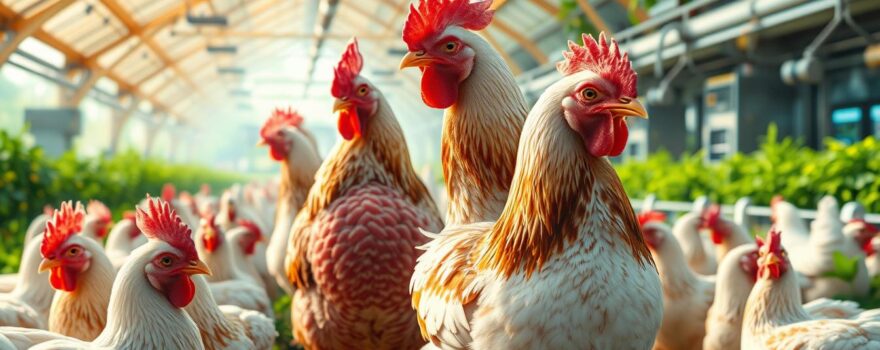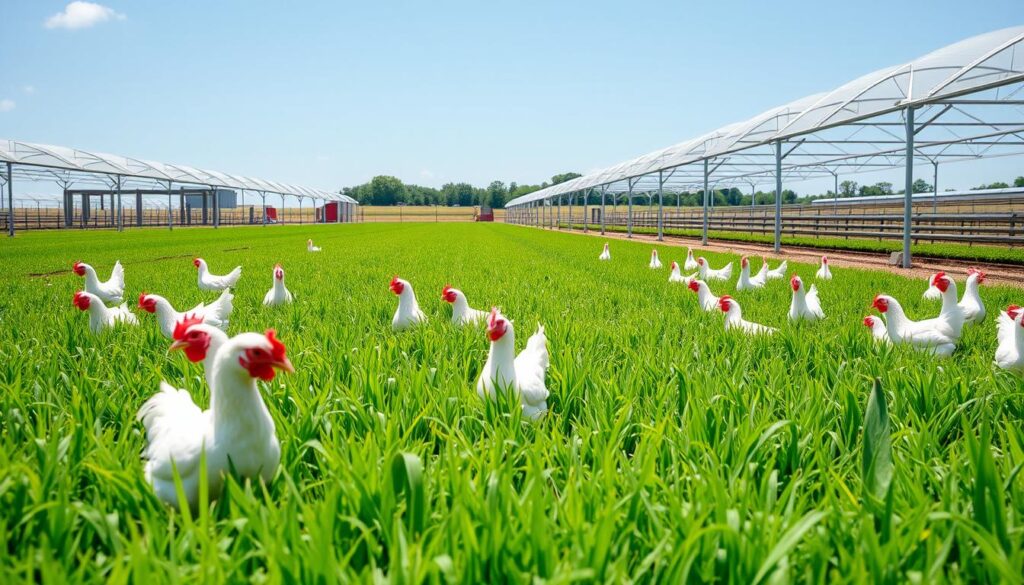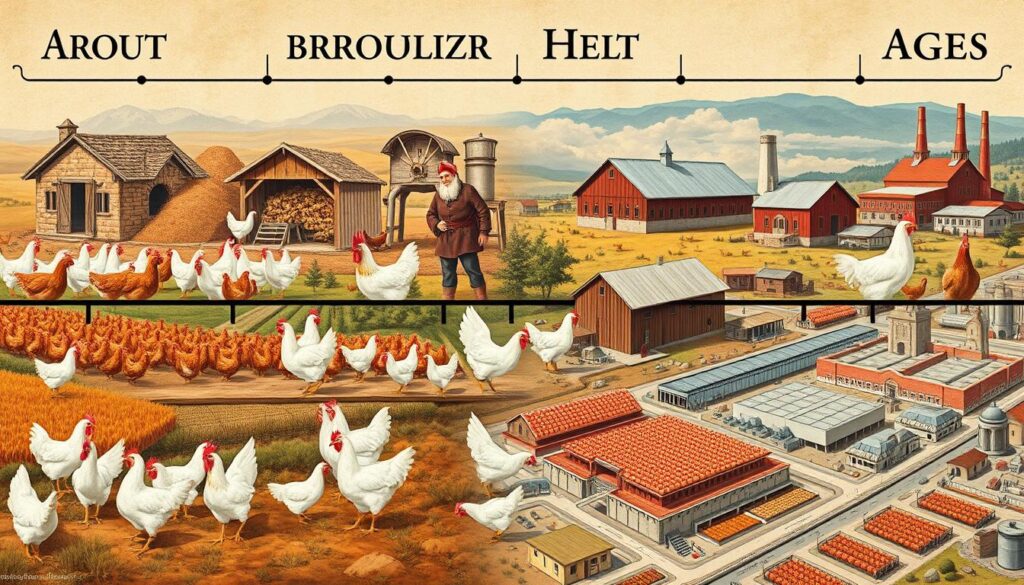
The genetic improvement of broiler chickens raises big ethical questions. It touches on animal welfare, sustainable farming, and food security worldwide. The poultry industry uses advanced breeding to make chickens grow faster and eat less. But, this raises big questions about treating living beings just for our needs and profit.
This article looks into the ethics of improving broiler chickens. It talks about the pain and suffering of these chickens and how to balance their welfare with human needs. We aim to give a detailed look at the ethical challenges in broiler genetic improvement.
The poultry industry keeps growing, driven by food demand and profit. The ethics of improving broilers are more important than ever. This article will cover the history, the good and bad of genetic engineering, and the big companies involved. We’ll explore how to make broiler production more ethical and sustainable. Our goal is to ensure the well-being of broiler chickens is valued, not just for efficiency and profit.
Introduction: The Dilemma of Poultry Welfare
Broiler chickens are a big source of protein around the world. They face growing concerns about animal welfare. These birds are bred for fast growth and high feed efficiency, often at the cost of their health.
The poultry industry is evolving fast. It’s hard to balance efficient food production with treating broiler chickens ethically.
Broiler Chickens and the Ethical Concerns Surrounding Their Treatment
Broiler chickens, raised for meat, have faced a lot of ethical questions. Genetic selection for higher yields and faster growth has harmed their health and well-being. They often suffer from skeletal, respiratory, and heart problems.
The Role of Genetic Selection in Shaping Broiler Health and Well-being
The poultry industry’s use of genetic selection has greatly affected broiler chickens. It has improved feed efficiency and egg yields. But, it has also harmed their overall welfare.
This balance between efficient food production and animal welfare is a big challenge. It’s a problem for the industry and policymakers.
| Key Statistic | Value |
|---|---|
| Global population of laying hens | 6.1 billion to 7.6 billion |
| Market share of Novogen, a leading layer breeding company | Around 6% as of 2012 |
| Average mortality rate for laying hens at 60 weeks | Close to 8%, exceeding published targets |
| Eggs per hen housed expected in the future | 500 over a 100-week period |
“The use of genomic information and genetic engineering is being explored to enhance genetic improvements for welfare traits in laying hens.”
Intrinsic Ethical Factors: Assessing Broiler Sentience
Broiler chickens face a big ethical issue: their ability to feel pain and suffer. They are bred intensively, which affects their well-being. Studies show that broiler chickens can feel pain and distress, proving they are more than just “production units.”
Questions about self-awareness and consciousness in broiler chickens are also key. The debate on their sentience is ongoing. Yet, evidence suggests they have some level of self-awareness and consciousness. This means their lives have inherent value that we must consider.
The Capacity for Pain and Suffering in Broiler Chickens
Many studies have shown that broiler chickens can feel pain and distress. They have the neural pathways to send pain signals and brain areas to perceive pain. This shows they are not just passive, but can feel negative sensations.
Self-Awareness, Consciousness, and the Value of Broiler Life
The debate on broiler chickens’ self-awareness and consciousness is ongoing. Yet, evidence suggests they have some level of consciousness. This raises big ethical questions about their production and slaughter.
When we think about broiler chickens, their pain and suffering, and potential consciousness are key. We must balance these with human food needs. This is a complex challenge that demands our careful thought and ethical consideration.
Extrinsic Ethical Factors: Balancing Human Needs
There are more than just internal reasons to think about the ethics of raising broiler chickens. The need for these chickens to feed the world, food security, and the impact of consumer demand and the economic realities of the poultry industry add to the complexity. This creates a tough situation where we must weigh human needs against animal welfare.
The Necessity of Broiler Production for Food Security
The world’s growing population has led to a focus on efficient food production, especially in poultry. This shift to broiler production has helped meet human needs for food security. It’s especially important in crowded cities and areas with little land for farming.
Consumer Demand and the Economic Realities of the Poultry Industry
The poultry industry is driven by consumer demand for cheap and easy-to-get protein. This has led to intensive farming practices that focus on making money rather than animal care. The need for poultry producers to stay competitive in a global market adds to the ethical dilemma.
| Ethical Factor | Impact on Broiler Production | Potential Solutions |
|---|---|---|
| Food Security | Necessity of broiler production to meet global demand for affordable protein | Promote sustainable farming practices, improve resource efficiency, and explore alternative protein sources |
| Consumer Demand | Pressure to maintain low prices and high production volumes, leading to intensive farming methods | Educate consumers on the ethical implications of their choices, encourage demand for higher-welfare products |
| Economic Realities | Poultry producers facing competitive pressures, leading to prioritization of efficiency over animal welfare | Provide financial incentives and support for farmers to adopt more ethical practices, foster industry-wide sustainability initiatives |
Finding a balance between feeding the world and caring for animals is a big challenge. We need to look at social, economic, and environmental factors. The goal is to make broiler production both ethical and sustainable.

Ethical Considerations in the Genetic Improvement of Broilers
The poultry industry is always looking to improve genetics. This push for better genetics raises important ethical questions. Broiler chickens are bred to grow faster and eat less, making the industry more productive and profitable. But, this progress also worries about the animals’ well-being and quality of life.
Fast growth can harm broiler health and welfare. Research shows it can cause skeletal problems, heart issues, and make them more prone to diseases. These issues can lead to pain, suffering, and a shorter life for the chickens. Balancing the drive for higher productivity with the ethical imperative to ensure animal welfare is a significant challenge facing the industry.
Genetics companies play a big role in broiler welfare. These companies focus more on production traits than on animal well-being. Their choices can greatly affect the chickens’ lives. The need for greater transparency and accountability in the decision-making process of these companies is a pressing issue that deserves attention.
| Potential Benefits of Genetic Improvement | Ethical Concerns |
|---|---|
|
|
As the industry seeks genetic improvements, it must consider both benefits and ethics. Finding a balance between productivity and animal welfare is key. Ensuring transparency and accountability will help move towards more ethical broiler production.
“The simulation demonstrated that genetic gain could be accelerated by up to 81% for multiple generations through gene editing.”
Broiler Welfare from the Farmer’s Perspective
Broiler farmers face tough choices in modern poultry farming. They must balance animal welfare with the need to make money. Leg weakness, footpad dermatitis, and lameness in chickens show this delicate balance.
Ethical Dilemmas Faced by Broiler Farmers
Broiler farmers know the ethical issues of treating their animals. Footpad dermatitis in chickens can be as high as 90%. Lameness can affect up to 30% of them. These numbers highlight the challenges farmers have in keeping their chickens healthy.
Empathy Towards Farm Animals and Economic Realities
Broiler farmers care deeply for their animals but also face economic pressures. The effect of how many chickens are kept together is a big issue. Lower numbers can improve welfare but cut into profits.
New ideas, like using elevated platforms and straw bales, can boost welfare by up to 30%. But, finding a balance between doing what’s right and making money is hard.
“As a farmer, I’m constantly torn between doing what’s best for my animals and ensuring the financial sustainability of my operation. It’s a fine line to walk, but I’m committed to finding ways to prioritize broiler welfare without compromising the realities of the industry.”
The challenges faced by broiler farmers show the poultry industry’s complexity. Understanding these issues helps us work towards better, more humane farming. This benefits both the animals and the farmers who feed our communities.
The Historical Context: Broiler Treatment Through the Ages
To understand the ethics of broiler chickens today, we must look back. The way we raise chickens has changed a lot over time. In the old days, raising chickens was very different from how it is now.
Poultry Production Practices in the Pre-industrial Era
Back then, raising chickens was a small, local job. Chickens were often kept with other animals in a more natural way. They could move around, get sunlight, and eat local foods.
This old way of raising chickens focused on their health and happiness. It wasn’t about making a lot of chickens fast.
The Rise of Intensive Broiler Farming and Its Impact on Welfare
In the mid-20th century, chicken farming changed a lot. Intensive broiler farming became popular. This was because people wanted more chicken meat that was cheap and easy to get.
This new way of farming focused on growing chickens fast and making them cheap. But it hurt the chickens a lot. They were kept in small, dark places with no room to move or act naturally.
| Characteristic | Pre-industrial Era | Intensive Broiler Farming |
|---|---|---|
| Housing | Free-range, access to natural light and space | Confined, cramped, and dimly lit environments |
| Diet | Locally sourced grains and forage | Specialized, high-energy feed formulations |
| Growth Rate | Slower, more natural growth | Rapid growth through genetic selection |
| Welfare Considerations | Prioritized overall well-being | Focused on production efficiency |

The change from old ways to new farming methods hurt chickens a lot. Knowing this history helps us see why we need to think about chicken welfare today.
Promises and Pitfalls of Genetic Engineering in Broilers
The use of genetic engineering in broilers has both good and bad sides. It could make broilers healthier and happier. But, we must think about the ethics and risks of changing their genes.
The Potential Benefits of Genetic Engineering
Genetic engineering could make broilers stronger and less sick. It might also help them grow better and breathe easier. This could make their lives better.
It could also cut down on health problems like lameness and sudden death. These changes could really help the animals.
Ethical Concerns and Risks
But, changing broilers’ genes raises big questions. We worry about the side effects and if it’s right to change living things. It could also make the poultry industry more unfair.
Big companies might get too much power. This could make things worse for everyone else. We need to think about fairness and how to share the benefits.
| Potential Benefits of Genetic Engineering in Broilers | Ethical Concerns and Risks |
|---|---|
|
|
The debate on genetic engineering in broilers is ongoing. We need to think carefully about the good and bad sides. Research, open talks, and caring for animal welfare are key to making it work.
The Role of Genetics Companies in Broiler Welfare
In the poultry industry, a few major genetics companies have a big impact. They shape the breeding goals and priorities that affect broiler chickens’ welfare. These companies focus more on production traits than on the health and comfort of the animals.
Market Dominance of Major Genetics Companies
The broiler breeding industry is dominated by a few big companies. These companies have the best breeding stock for the global broiler industry. Their power lets them decide what traits are important, often at the cost of animal welfare.
Breeding Goals and the Prioritization of Production Traits
The main genetics companies aim to improve traits like fast growth and more breast meat. These traits have made the industry successful but hurt broiler welfare. Fast growth, for example, can lead to health problems like leg issues and heart troubles.
| Trait | Genetic Improvement | Impact on Broiler Welfare |
|---|---|---|
| Growth Rate | Improved by 0.74 days per year in the U.S. | Increased susceptibility to leg disorders and cardiovascular issues |
| Breast Meat Yield | Improved by 0.5% per year in the U.S. | Increased metabolic stress and reduced mobility |
| Feed Conversion Ratio | Decreasing by 0.025 per year in the U.S. | Potential for reduced feed intake and increased hunger |
The focus on production traits by genetics companies harms broiler chickens’ health and behavior. This has led to many welfare issues. The industry needs to rethink its breeding goals and consider the ethics of its practices.
Moving Towards Ethical Broiler Production
The demand for poultry is growing fast. The broiler industry must balance animal welfare, environmental care, and making money. To achieve ethical broiler production, we need a plan that cares for chickens and supports the industry.
Balancing Welfare, Sustainability, and Economic Viability
Finding this balance is tough, but new ideas are helping. Digital phenotyping uses AI, ML, and IoT to change the game. It helps farmers know more about their chickens, making production better and kinder.
But, using digital phenotyping costs a lot and needs special skills. It also needs strong systems to keep data safe from hackers.
The Need for Transparent and Ethical Practices
The poultry industry must also show it cares. This means stopping battery cages, ending beak trimming, and choosing chickens wisely. These steps show the industry’s commitment to kindness and honesty.
By taking these steps, the industry can make a better life for chickens. It also gains respect from people who care about food and animals. This could make the industry more successful and sustainable.
The journey to ethical broiler production is hard, but it’s worth it. With a focus on new ideas, openness, and caring for chickens, the industry can lead the way to a better food future.
The world of broiler genetic improvement is complex, with many ethical factors to consider. This article looked at the key issues, from how much pain chickens feel to the costs of raising them. It shows that making broilers better can help animals, farmers, and consumers, but we must think carefully about ethics.
As the poultry industry grows, it’s crucial for everyone involved to work together. This means genetic companies, farmers, and government officials must follow ethical rules. They should focus on the chickens’ welfare and also deal with the bigger issues of food production.
This way, the industry can move towards a more ethical and responsible future. It’s all about finding a balance between animal care, the planet, and making money.
In the end, we need to keep talking, researching, and finding new ways to improve. This ensures that ethics stay a top priority in the poultry world. By tackling these big challenges, the industry can meet its duties to animals and people. It will also help make food more sustainable and available for everyone.